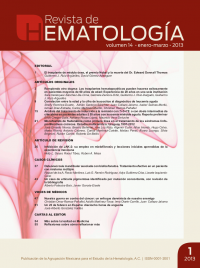RESUMEN
Antecedentes: los síndromes linfoproliferativos crónicos constituyen las hemopatías malignas más frecuentes del adulto en el mundo Occidental. Sus manifestaciones clínicas más habituales son la leucemia linfoide crónica B (LLC-B) y los linfomas no-Hodgkin (LNHs), casi siempre de estirpe B de bajo grado (LNH-BG).
Objetivo: evaluar la supervivencia global y libre de eventos, complicaciones y calidad de vida en pacientes que, al padecer síndromes linfoproliferativos crónicos (LLC-B y LNH de bajo grado de malignidad) recibieron fludarabina monofosfato en presentación oral o inyectable como tratamiento de primera línea en un grupo de instituciones médicas de Uruguay, a lo largo de todo su territorio (capital e interior del país) en el curso de los últimos 15 años (1997-2012).
Pacientes y método: estudio retrospectivo en el que se evaluó la supervivencia global a 12 años y la libre de eventos en una cohorte de 351 pacientes con síndromes linfoproliferativos crónicos, leucemia linfoide crónica B y linfomas no-Hodgkin de bajo grado en un grupo de los Servicios Clínicos de la República Oriental del Uruguay que recibió monofosfato de fludarabina oral o intravenosa como tratamiento de primera línea oncológica.
Resultados: en el grupo de pacientes con leucemia linfoide crónica B tratados con monofosfato de fludarabina, el límite de respuesta global fue de 78%, con supervivencia global de 36% a 12 años y
supervivencia libre de enfermedad de 11% a 12 años. En el grupo de pacientes con LNH-BG la supervivencia global a 12 años fue 48% y la supervivencia libre de enfermedad 44%. Las formulacio-
nes oral e intravenosa no mostraron diferencias significativas en eficacia terapéutica.
Conclusiones: la fludarabina monofosfato es un fármaco efectivo y seguro para tratamiento de la LLC-B y los LNH-BG. Las formulaciones oral e intravenosa evidencian igual respuesta en pacientes
jóvenes y añosos en esta cohorte de individuos con síndromes linfoproliferativos crónicos. En la actualidad se están estudiando opciones quimioterápicas combinadas con fludarabina.
Palabras clave: alteraciones linfoproliferativas, monofosfato de fludarabina
ABSTRACT
Background: chronic lymphoproliferative disorders are the mostcommon hematological malignancies in adults in the western world. Their most common clinical manifestations are chronic B lymphocytic leukemia (B-CLL) and non-Hodgkin lymphomas (NHLs), usually low grade B-cell lymphomas(NHL-LG).
Objective: to assess overall survival ,event-free complications and quality of life in patients, to suffer chronic lymphoproliferative disorders (B-CLL and low-grade NHL of malignancy) receiving
fludarabine monophosphate in presentation oral or injection, as first-line treatment in a group of medical institutions in Uruguay, throughout their territory (capital and the country) during the last
15 years (1997-2012).
Patients and methods: retrospective study that evaluated overall survival at 12 years and free of events in a cohort of 351 patients with chronic lymphoproliferative disorders, B chronic
lymphocytic leukemia and non-Hodgkin lymphomas of low grade, in a group of Clinical Services of the Republic of Uruguay, receiving fludarabine monophosphate oral or intravenous as first line cancer therapy.
Results: In the group of patients with chronic lymphocytic leukemia B treated with fludarabine monophosphate, the limit of overall response was 78%, with overall survival of 36% at 12 years and
disease-free survival of 11% at 12 years. In the group of patients with NHL-LG overall survival at 12 years was 48% and disease free survival 44%. Oral and intravenous formulations showed no significant differences in therapeutic efficacy.
Conclusions: fludarabine monophosphate is an effective and safe drug for the treatment of B-CLL and NHL-LG. Oral and intravenous formulations show the same response in younger and older patients in this cohort of individuals with chronic lymphoproliferative disorders. It is currently being studied chemotherapeutic options combined with fludarabine.
Key words: Lymphoproliferative disorders, Fludarabine monofosfate, CLL, NHL

